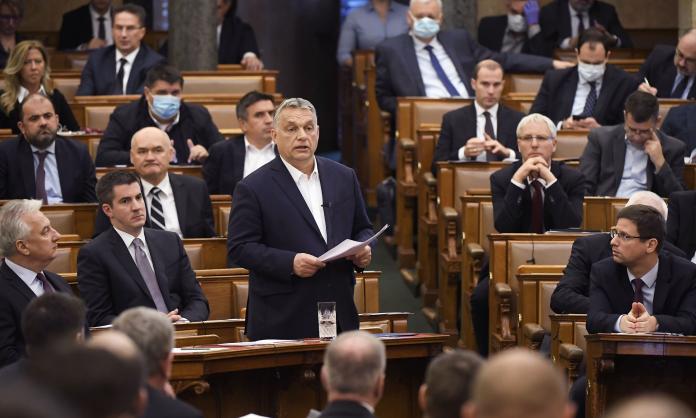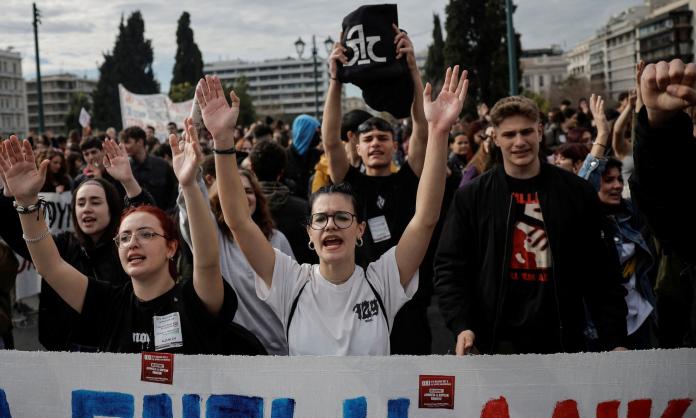Hungary’s hard right, nationalist prime minister Victor Orbán’s special COVID-19 emergency powers were ended on 16 June by the Hungarian parliament. These powers were passed in March, as much of the world entered lockdowns due to the pandemic. Orbán declared a state of emergency, and the “Coronavirus Act” allowed Orbán to bypass parliament and rule by decree for an indefinite period.
Orbán and his hard right Fidesz party are trying to use this move to discredit their critics and show that democracy is alive and well in Hungary. But, as Budapest-based democracy watchdog Karoly Eotvos Institute argues, the ending of Orbán’s extraordinary powers is a political sleight of hand. According to Hungarian journalist Adam Harangozó, rather than a return to the pre-pandemic order of things, the government is replacing the state of emergency with a “medical crisis”, which “extends [Orbán’s rule-by-decree powers] indefinitely and removes the last remaining constitutional safeguards, allowing the government to deviate from the constitution in any way it deems necessary”. A joint statement has been issued by some of the most prominent Hungarian civil watchdog organisations warning about the dangers of this new legal order, describing it as an “optical illusion”.
In addition to granting Orbán extraordinary powers, the Hungarian parliament – where Fidesz holds a two-thirds supermajority – under the cover of the crisis also passed an omnibus bill ostensibly to help deal with the crisis but which will have far-reaching consequences for democratic freedoms and civil rights. The measures include funding cuts for opposition-controlled municipal councils, the creation of special economic zones, the modification of labour laws, strengthening of the military, attacks on transgender people and restrictions on press freedom.
Orbán is just one of many hard right rulers using the pandemic as both a justification for increasing authoritarianism and as a smokescreen to rush through unpopular legislation. Hungary’s neighbour Poland, similarly governed by a hard right nationalist party, threatened to go ahead with a postal vote for its May presidential election. Choosing to hold the ballot in the middle of a lockdown would have denied opposition parties the ability to campaign, and many in the opposition suspected the postal ballot would be more susceptible to tampering.
Another feature has been the involvement of the military in managing a public health crisis. This was the case in Hungary but also other countries like Indonesia and the Philippines. Both these countries were slow to respond to the seriousness of the pandemic, and their underfunded public health systems have been playing catch-up since. The involvement of the military in the managing of the crisis speaks to the lack of existing public health infrastructure in the first place.
However, in the Philippines, it is the defence secretary – not a health department official – who leads the coronavirus task force. In fact, all three senior figures on the task force are former military leaders. In April, Philippine president Rodrigo Duterte ordered all police and military patrolling the streets to shoot anyone who breached quarantine rules. Around 120,000 people have been arrested so far. As a representative of the leftist party Bayan Muna said in March, “Are we now in a state of undeclared martial rule and a de facto junta is now running the country?”
It can be tempting to cast this tendency towards repression as a problem unique to those states deemed authoritarian. “It is not a coincidence”, wrote former US secretary of state Madeleine Albright in the Economist in May, “that the pandemic started in a country where the government does not trust its people, suppresses the free flow of information and prevents its officials – including health professionals – from speaking the truth. It is also not a coincidence that many of the countries that have dealt effectively with the virus are strong democracies”. Albright’s simplistic division of the world into authoritarian and democratic camps not only obscures some real deficiencies in so-called liberal democracies’ responses to the pandemic (Sweden being a case in point) but also effaces the authoritarian and opportunistic ways in which these states have responded to the pandemic.
Speaking with Red Flag, the head of the London-based Institute for Race Relations, Liz Fekete, says Albright’s mainstream liberal take is “myopic” and that “authoritarianism is hardwired into neoliberalism”. Fekete said that in Britain there has been a marked increase in police tactics such as use of tasers and stop-and-search, particularly in migrant communities and communities of colour, since the onset of the pandemic. In France, liberal president Emmanuel Macron argued for the need to “win the economic war” against coronavirus and issued a series of decrees that scrapped the 35-hour working week and allowed employers to force employees to work up to 60 hours, among other measures.
In Australia, home affairs minister Peter Dutton in May used the distraction of the pandemic to introduce the ASIO Amendment Bill into Parliament. If passed, the bill would allow children as young as 14 to be questioned by ASIO, thwart their right to legal representation and allow the tracking of individuals without a warrant.
At one level, authoritarian or repressive measures simply reflect the continuation of these states’ pre-pandemic trajectories. Hungary had already attacked the press and opposition groups, and bolstered the repressive arm of the state. Duterte in the Philippines had already organised extrajudicial killings under the guise of a so-called drug war. Macron had already significantly undermined French workers’ rights, most recently by attacking the pension system. And the ASIO Amendment Bill is just the latest in an enormous suite of so-called anti-terror legislation passed since 9/11.
But the pandemic and its accompanying economic chaos have tended to accelerate these trends. As Fekete puts it, “The veil has come away from the mirror, and the pandemic is reflecting what’s been going on in neoliberal states for decades”.
All nation states – from Duterte’s Philippines to Macron’s France – are part of global capitalism. States under capitalism function to oppress the majority and maintain the power of the ruling minority. In the age of neoliberalism, in which there has been a massive transfer of wealth to the already rich at the expense of workers’ living standards and rights, the state has played an important role in undermining our capacity to fight back, by increasing repression, militarising borders and bolstering the police and surveillance apparatus. It has become second nature for most governments to advance this agenda when the opportunity arises, even those which, for the most part, prefer to rule through consensus rather than coercion.
Of course, not every measure limiting people’s movement during the pandemic was driven by the desire for more authoritarian powers. Measures such as the temporary closure of schools and borders and limiting people’s capacity to gather in large groups have proven indispensable in reducing community transmission of the virus. But the COVID-19 outbreak caught the ruling class around the world off guard. When the capitalists feel threatened, they can resort to more authoritarian measures such as censorship, repression and violence to protect the status quo.
Then there’s the response of Brazil and the US to the pandemic. Their respective presidents, Jair Bolsonaro and Donald Trump, followed a different pattern from leaders like Orbán and Duterte – to whom they’re often compared. Rather than using the crisis to strengthen their formal power and intimidate opponents, they employed a strategy of corona denialism, a strategy nevertheless intended to appease their right wing supporters.
Not surprisingly, both countries consequently top the world when it comes to numbers of active coronavirus cases and deaths caused by the virus. In both countries, social distancing and lockdowns became polarised, politicised questions.
Brazilian academic Bernardo Bianchi says Bolsonaro worked hard to paint public health measures as “leftist”. The president made a show of hosting rallies without social distancing or mask wearing, and Brazil has now stopped publishing its COVID-19 toll and has wiped the official site clean of previous data.
“Bolsonaro thrives on chaos”, Bianchi says. For the entire time that Bolsonaro has been in politics, he has used chaos and division to amass support. Even now, in the midst of a pandemic and with bodies piled into mass graves, polls indicate around 30 percent of Brazilians rate his presidency as good or excellent.
But according to Bianchi, that support hinges on Bolsonaro’s ability to maintain a strong economy. Faced with a potential contraction of the Brazilian economy by anywhere between 6 and 10 percent this year, Bolsonaro’s aim is to blame the left and its lockdowns for the country’s poor economic performance. And while Bolsonaro’s support on the right of the political establishment is fracturing, he continues to count on the backing of the military top brass and retired generals, many of whom populate his cabinet.
Importantly, his base has recently staged mass rallies in major cities against lockdowns and calling for Congress and the Supreme Court to be shut down. This highlights that anti-lockdown sentiment is not primarily motivated by concern about civil liberties. Rather, these protesters call for an end to Brazilian democracy and a return to military rule. Fortunately, each of these protests has been met with counter-demonstrations calling for Bolsonaro to be removed from office and defending democratic rights.
As the social, economic and public health crises continue to deepen, the world’s ruling classes will only become more ruthless in their efforts to ensure profits continue and their grip on power remains firm. And to do this, they will employ a variety of strategies. Whatever the political colour of the governments, this will mean attacks – through increasing government power, the underfunding of vital health services or restrictions that unfairly target workers and the poor. The recent wave of struggle – from Brazil to France to the US – provides hope that this offensive can be pushed back.










